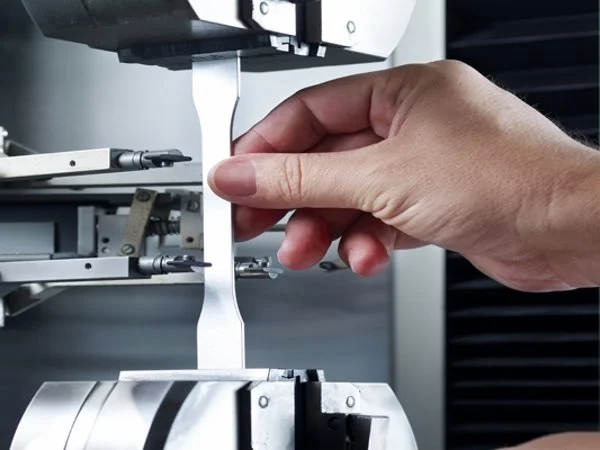Forged Component Mechanical Testing
In the oil and gas sector, forged components are critical to the integrity of pipelines, pressure vessels, and other machinery. These components undergo extreme conditions that can degrade material properties over time. Therefore, it is essential to perform comprehensive mechanical testing to ensure they meet stringent quality standards.
Forged component mechanical testing involves a series of laboratory tests designed to evaluate the strength, ductility, toughness, and fatigue resistance of materials used in these components. The tests are conducted on various specimens taken from the forgings under controlled conditions that replicate real-world operating environments as closely as possible.
The primary objective is to assess whether the material meets specified quality criteria for use in oil and gas applications. This includes compliance with international standards such as ISO 9001, ASTM E8M, EN 10217-1, and ASME Section VIII Division 2.
Forged component mechanical testing typically covers a range of tests including tensile strength, yield strength, impact testing (Charpy or Izod), hardness testing, and fatigue testing. Each test provides critical insights into the material's performance under specific loading conditions. For instance, fatigue testing is crucial for identifying any potential weaknesses that could lead to failure in high-stress environments.
During these tests, specimens are carefully prepared according to specified dimensions. The preparation process ensures uniformity and consistency across all samples tested, which is vital for obtaining accurate results. Specimens are then subjected to various mechanical loads using specialized equipment tailored to the specific test being conducted. Precision instruments like universal testing machines (UTMs), hardness testers, and impact testers play a pivotal role in these measurements.
The results from these tests are meticulously recorded and analyzed by experienced technicians who interpret them against established standards. Reporting is comprehensive, detailing not only numerical values but also graphical representations such as stress-strain curves for tensile tests or fracture surfaces for impact testing. Compliance with regulatory requirements is ensured through certification processes that validate the integrity of both materials and final products.
Why It Matters
The importance of forged component mechanical testing cannot be overstated, particularly within the oil and gas industry where reliability and safety are paramount. Ensuring compliance with international standards helps prevent costly failures that could result in accidents or environmental disasters.
- Reduces risk of catastrophic failure
- Ensures regulatory compliance
- Aids in product optimization through data-driven decisions
- Promotes trust among stakeholders by providing transparent quality assurance
Why Choose This Test
Selecting forged component mechanical testing offers several advantages for businesses operating in the oil and gas sector:
- Promotes consistent quality across production runs.
- Identifies potential flaws early, allowing for corrective actions before full-scale manufacturing begins.
- Supports innovation by providing detailed insights into material behavior under different conditions.
- Facilitates easier procurement of materials that meet specific project requirements.
Use Cases and Application Examples
| Component Type | Testing Scenario | Expected Outcome |
|---|---|---|
| Pipeline Fittings | Tensile and fatigue testing to ensure longevity in harsh environments. | Confirmation of strength, ductility, and resistance to cyclic loading. |
| Pressure Vessels | Impact testing to assess toughness at low temperatures. | Evidence that the material can withstand sudden impact without fracturing. |
| Turbine Blades | Hardness and tensile strength tests for durability under high stress conditions. | Demonstration of resistance to wear and tear during operation. |
- Testing forgings before assembly ensures that only qualified components are used, thereby enhancing overall system reliability.
- Data from mechanical tests can be leveraged for continuous improvement efforts aimed at developing more robust designs and manufacturing processes.
- The results of these tests contribute significantly to the certification process required by regulatory bodies like OSHA and API.





